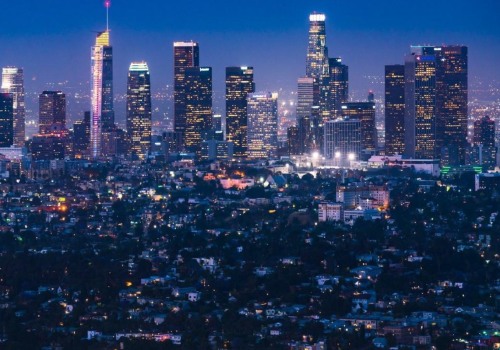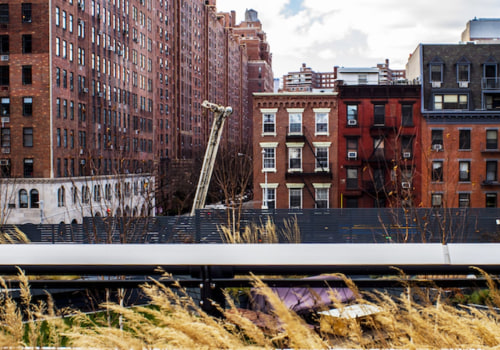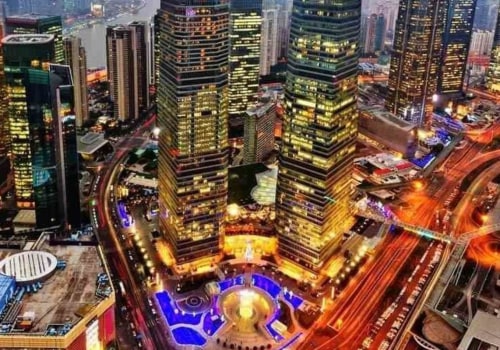From its humble beginnings as a French trading post to its current status as a major industrial center, Detroit has come a long way in its illustrious history. It has become one of the most important industrial cities in the world, and is a key part of the global economy. In this article, we will explore Detroit's role as an industrial center, and what it has done to help shape the world economy. Detroit has long been known for its automotive industry and its contribution to the manufacturing sector. Over the years, it has become a hub for other industries as well, such as finance and technology.
We'll take a look at how Detroit's industrial prowess has contributed to its growth and success, as well as its current role in the global economy. We'll also explore some of the challenges Detroit has faced in recent years, and how these have affected its ability to remain a key player in the world economy. Finally, we'll discuss how Detroit can continue to be a major industrial center in the future. Detroit has a long and proud history as an industrial center. It was founded in 1701 as a small village and grew to become a major industrial powerhouse. The city's economy was heavily reliant on the industrial sector, with its major industries including automobile manufacturing, steel production, and shipbuilding.
The city's industrial strength also helped shape its social, cultural, and political landscape, as it was home to a large number of workers and their families. Over the years, Detroit has undergone tremendous changes. The city experienced an economic downturn in the 1950s and 60s due to the decline of the automobile industry and the rise of automation, globalization, and other factors. However, the city has since seen a resurgence in its industrial sector, with major industries such as automotive parts production, health care, and technology making up a large portion of the city's economy. Detroit is also home to numerous Fortune 500 companies and has seen significant investment in its infrastructure in recent years. Despite this progress, there are still challenges that Detroit faces in maintaining its industrial sector.
These include a need for increased investment in infrastructure, technology, and workforce development, as well as addressing challenges related to poverty, crime, and inequality. Additionally, the city must grapple with the impact of globalization on its industries and how to ensure that they are able to compete in a global marketplace. The future of Detroit's industrial sector is uncertain but there are reasons for optimism. The city has made significant strides towards addressing its challenges and is continuing to attract new investments in its industries. Additionally, its proximity to Canada gives it a unique advantage in terms of trade opportunities and foreign direct investment.
With continued efforts to address its challenges and promote economic development, there is potential for Detroit to be an important industrial center in the world economy for many years to come.
Detroit's Current State
Detroit is currently the largest city in Michigan and one of the most important industrial centers in the United States. Detroit's industrial sector is responsible for a significant portion of the city's economy, and has been a major contributor to its growth in recent decades. Detroit is home to several major automotive companies, as well as a number of other industrial giants, such as steel, petroleum, and chemical producers. These industries have had a positive impact on Detroit's economy, creating jobs and providing a stable source of income for many of its citizens. However, Detroit faces a number of challenges in maintaining its industrial sector.The city's economy has been affected by the shifting nature of the global economy, with many of its major industries facing increased competition from abroad. Additionally, Detroit has seen a decrease in population in recent years, leading to a decrease in demand for its goods and services. To address these issues, the city has taken steps to diversify its economy by investing in new industries such as healthcare, technology, and education. Additionally, Detroit has implemented initiatives to attract new businesses and encourage investment in existing ones. Overall, Detroit remains an important industrial center in the world economy.
Its industrial sector has had a significant impact on its economy and has shaped its social, cultural, and political landscape. Despite some challenges, Detroit is continuing to invest in new industries and initiatives to maintain its current level of economic development.
Impact of Detroit's Industrial Sector on Society
Detroit's industrial sector has had a major impact on its social, cultural, and political landscape. The city's industrial history dates back to the late 19th century, when it was established as a manufacturing hub for the automotive industry. The rise of the auto industry in Detroit was followed by a period of tremendous economic growth and prosperity for the city.The city's population grew rapidly and its economy boomed, leading to the development of new businesses and services. This economic growth also led to the emergence of a large middle class in the city. However, Detroit's industrial sector has also had some negative consequences. The rise of automation and globalization have led to job losses in the city, resulting in increased poverty and inequality. Additionally, the decline of the auto industry has left many of Detroit's neighborhoods blighted and abandoned.
These negative effects have had profound implications for Detroit's social, cultural, and political landscape. The decline of Detroit's industrial sector has also had an impact on the city's political landscape. The city has seen a shift away from traditional urban politics towards more progressive policies. This shift is evident in the city's efforts to combat poverty and inequality, as well as its focus on sustainability and urban renewal. Additionally, Detroit has become a center for social activism, with many organizations advocating for economic justice and civil rights. The impact of Detroit's industrial sector on its social, cultural, and political landscape is undeniable.
While the city has seen job losses and poverty due to automation and globalization, it has also seen a shift towards more progressive policies and increased social activism. As the city continues to strive for economic justice and civil rights, it is likely that its industrial sector will continue to have a major impact on its social, cultural, and political landscape.
Detroit's Evolution as an Industrial Center
Detroit, Michigan has a long and storied history as an industrial center. From its early beginnings as a small village in the 1700s, Detroit has grown to become one of the most important cities in the United States. The city’s transformation from a small settlement to a major industrial powerhouse was driven primarily by its strategic location on the Detroit River and its proximity to Canada.This allowed Detroit to take advantage of its access to raw materials, skilled labor, and transportation networks. The automotive industry was the first major industry to take hold in Detroit, as Henry Ford’s assembly line revolutionized production and changed the face of the automotive industry. This spurred growth in other industries such as steel production, machine tools, and manufacturing. Detroit also became a hub for the aerospace industry with the construction of the Willow Run bomber plant during World War II. In addition to the automotive and aerospace industries, Detroit has also seen growth in other industries such as health care, education, and technology. These industries have helped to diversify the economy and drive growth.
However, the decline of traditional manufacturing in recent years has had a negative impact on the city’s economy. Despite this decline, Detroit remains an important center for manufacturing and industry. The impact of Detroit’s industrial sector on its economy is undeniable. It has created jobs, provided tax revenue for local governments, and generated economic activity that has helped to shape the city’s social, cultural, and political landscape. Furthermore, it has enabled Detroit to remain competitive in a global economy. The future of Detroit as an industrial center is uncertain.
While some industries have seen declines in recent years, others have seen growth and new opportunities have emerged. It is clear that Detroit will continue to be an important part of the global economy for many years to come.
Impact of Detroit's Industrial Sector on Society
Detroit's industrial sector has had a tremendous impact on the city's social, cultural, and political landscape. From its beginnings as a small town in the early 19th century, Detroit has been transformed into a major industrial powerhouse that was the symbol of American industrial might and progress. Detroit's rise to industrial prominence was largely due to its strategic location on the Great Lakes and its access to transportation routes.As a result, Detroit became a major center for manufacturing and transportation industries, with auto manufacturing being the most prominent. The auto industry not only created jobs, but it also shaped Detroit's social, cultural, and political landscape. The influx of people from other countries and states looking for work in Detroit created a diverse population. This diversity has given Detroit unique cultural characteristics and has helped shape its identity.
Additionally, the auto industry's growth has had an impact on Detroit's political landscape. The city was an important political force during the 20th century and its influence continues to be felt today. However, changes in the global economy have had an impact on Detroit's industrial sector. The rise of automation and globalization has put pressure on traditional manufacturing jobs, leading to a decrease in employment opportunities in the city.
Additionally, the shift in global economic power away from traditional manufacturing centers like Detroit has had an effect as well. Despite these changes, Detroit is still a major industrial center and its impact on the city's social, cultural, and political landscape continues to be strong.
Detroit's Evolution as an Industrial Center
Detroit's story as an industrial center began in the early 1800s, when it was still a small village known as the Town of Detroit. The city was located on the Detroit River, which provided a convenient connection to the Great Lakes and access to the vast natural resources of the region. In the 19th century, Detroit quickly grew into a major industrial powerhouse, as its strategic location and proximity to resources made it an ideal hub for manufacturing.Detroit was also home to some of the country's earliest industries, such as iron works, sawmills, and shipbuilding. The city's industrial sector has been a major driver of economic growth over the years. During the late 19th century, Detroit was a leader in the automotive industry, with the first automobile factory being established in 1884. This was followed by the introduction of electric streetcars and the development of other mass production industries. By 1910, Detroit had become the fourth-largest city in the United States and was home to over 2 million people. More recently, Detroit has seen significant growth in manufacturing industries such as automotive components, IT services, and logistics.
These industries have helped to drive economic growth and employment opportunities in the city. Moreover, Detroit's manufacturing sector has had a major impact on the city's culture and politics, as it has shaped its identity and made it a major player in the global economy.
Detroit's Current State
Detroit is currently a major industrial center in the world economy, with its automotive and manufacturing industries playing a key role in the city's economy. The city has seen a resurgence in recent years, with increased investment from the automotive sector and new businesses moving into the city. This has led to an increase in jobs and a growing economy.The automotive industry is the biggest employer in Detroit, with major automakers such as General Motors, Ford, and Fiat Chrysler Automobiles all having a presence in the city. These companies employ thousands of people directly and indirectly, providing a substantial economic boost to the city. Detroit is also home to many smaller manufacturing companies that produce parts for these automakers and other industries. However, despite the growth in Detroit's economy, there are still challenges facing the city.
The manufacturing sector is facing stiff competition from other states and countries, leading to job losses and plant closures. Detroit's infrastructure has also been in need of repair for some time, with crumbling roads and bridges making it difficult to move goods and services efficiently. To address these challenges, Detroit has been working to improve its infrastructure and attract new businesses to the city. The government has invested heavily in infrastructure projects, such as the construction of new roads and bridges, as well as investing in public transportation.
The city has also been encouraging businesses to invest in Detroit by providing tax incentives and other incentives to attract new businesses. In addition to this, Detroit is also working to attract new talent to the city. It has launched initiatives such as TechTown Detroit, which provides resources and support for entrepreneurs and tech startups. This is helping to create new jobs and attract investment into the city.
Overall, Detroit is still a major industrial center in the world economy and has made strides in recent years to strengthen its position. With continued investment into infrastructure projects and initiatives such as TechTown Detroit, it is hoped that Detroit will continue to be an important part of the global economy.
Detroit's Current State
Today, Detroit remains an important industrial center in the world economy. The city has a strong manufacturing base, with automotive, aerospace, and defense industries being the key drivers of its economy. In addition to these sectors, Detroit also has a thriving health care sector, a growing technology sector, and a well-established logistics industry.The city is home to major corporations such as General Motors, Ford Motor Company, and Chrysler Group. The automotive sector has been the cornerstone of Detroit's economy for many years, and continues to be so today. The industry has helped to drive the city's economic growth and job creation, with the Detroit metro area having more than 1.3 million auto industry jobs in 2020. The automotive sector also contributes significantly to the city's tax base, providing revenue for public services such as education and infrastructure. The aerospace and defense industries are also major contributors to Detroit's economy. Companies such as Boeing and Northrop Grumman have a significant presence in the city, and they continue to invest heavily in research and development projects in the region.
The sector provides high-paying jobs and brings in billions of dollars in revenue each year. In addition to its traditional industrial sectors, Detroit has also seen growth in its technology sector. Companies such as Google and Microsoft have invested heavily in the city's tech industry, creating thousands of jobs and bringing in new investment. The tech industry has also helped to diversify the city's economy, providing opportunities for entrepreneurs and start-ups. Despite its many strengths, Detroit still faces challenges in maintaining its industrial base. The city's aging infrastructure is a major challenge, as it is not capable of supporting the latest technologies or processes necessary for many companies.
Additionally, Detroit has seen a decline in its population since the 1950s, which has led to a decline in demand for goods and services produced in the city. To address these issues, the city is investing heavily in modernizing its infrastructure and developing new industries.
Impact of Detroit's Industrial Sector on Society
Detroit's industrial sector has had a profound effect on the city's social, cultural, and political landscape. From its inception as a small city, Detroit has grown to become an industrial powerhouse. The city has become synonymous with its automotive industry, which has had a profound impact on the city's economy, culture, and politics.Detroit's industrial sector has also provided many jobs, bringing in people from all over the world and creating a vibrant multicultural community. At the same time, changes in the global economy have had a significant impact on Detroit's industrial sector. Automation and globalization have seen many manufacturing jobs move away from Detroit, leading to a decline in its traditional industrial base. This has had a major impact on the city's economy, with unemployment and poverty levels rising dramatically.
It has also had an impact on the city's social fabric, with many people struggling to find work and support their families. Despite these challenges, Detroit remains an important industrial center in the world economy. Its automotive industry continues to be an important source of employment, while its other industries are diversifying and growing. The city is also becoming increasingly attractive as a destination for entrepreneurs and start-up companies, providing an important boost to the local economy.
In conclusion, Detroit's industrial sector has had a major impact on the city's social, cultural, and political landscape. Changes in the global economy have caused significant disruption, but Detroit remains an important industrial center in the world economy. Its automotive industry continues to be an important source of employment, while its other industries are diversifying and growing.
Detroit's Evolution as an Industrial Center
Detroit, Michigan has a long and storied history as an industrial center. From its early days as a small village to its current status as a major industrial powerhouse, Detroit has been shaped by its industrial sector.This section will explore the key industries that have driven Detroit's economic growth, the impact of this growth on the city and its people, and the prospects for the city's future. The industrial sector has been the cornerstone of Detroit's economy since the early 19th century. The city's location at the junction of several major rivers and its proximity to the Great Lakes and other transportation routes made it an ideal site for a variety of manufacturing and industry. Early industries included shipbuilding, automobile production, and steel production. These industries were critical to the city's growth and development, helping to create thousands of jobs and making it one of the largest cities in the country. The automobile industry was particularly important to Detroit's growth.
Henry Ford's assembly line revolutionized manufacturing, allowing for mass production of cars in Detroit. This led to an influx of workers from around the country, many of whom were drawn by the promise of high-paying jobs in the automobile industry. As a result, Detroit's population swelled and its economy boomed. By the mid-20th century, Detroit had become one of the largest cities in the United States. In addition to automobiles, Detroit also became home to a number of other industries.
These included pharmaceuticals, chemicals, aerospace, and defense. These industries attracted more workers to the city and helped create thousands of jobs. The industrial sector also had an impact on Detroit's social, cultural, and political landscape. For example, Detroit's African American community grew significantly during this period, thanks in part to the influx of African American workers seeking employment in the automobile industry. Today, Detroit is still home to a number of industrial plants and factories.
However, many of these facilities have closed or been relocated due to changing economic conditions. Despite these challenges, Detroit remains an important industrial center in the United States and is home to a variety of manufacturing plants and factories. It is also home to a thriving tech sector which includes companies such as Quicken Loans and Google. The future of Detroit as an industrial center is uncertain. The city is facing a number of challenges such as population decline and urban blight.
Despite these challenges, there is still hope for the city's future. With new investments in technology and manufacturing, Detroit can continue to be an important part of America's industrial landscape. The city of Detroit has a long and rich history as an industrial center, and its impact on the world economy has been immense. As the city continues to grow and develop, it will remain an important part of the global economy. Detroit's industrial sector has had a positive effect on its economy, and it has also shaped its social, cultural, and political landscape.
With continued investment in its infrastructure and workforce, Detroit is well-positioned to remain an important player in the world economy. As Detroit continues to move forward, it must look for ways to diversify its economy and reduce its dependence on the industrial sector. This could include investing in green technologies, developing new industries, and fostering an entrepreneurial spirit. It is also important for Detroit to maintain its commitment to diversity and inclusion, so that all of its citizens can benefit from its success as an industrial center.






